The 2012 MacBook Air (11 & 13-inch) Review
by Anand Lal Shimpi on July 16, 2012 12:53 PM EST- Posted in
- Apple
- Mac
- MacBook Air
- Laptops
- Notebooks
The Display
The MacBook Air is really Apple's mass-market notebook, and as such it's not going to be the target for a Retina Display upgrade, at least not this year. While technically feasible, my guess is a lack of supply kept a rMBA out of the cards for this year. There's also the matter of maintaining its thin profile and battery life in pursuit of a retina display.
The MacBook Air display continues to be good, and better than most, but no where near what the rMBP delivers and actually a step behind what the competition in the PC space has been cooking up.
If there was one clear trend at Computex this year it's towards IPS 1080p displays in Windows 8 notebooks. ASUS actually pre-empted all of the exciting announcements (rMBP included) with its Zenbook Prime, complete with 11 and 13-inch 1080p IPS displays. As the MacBook Air retains its TN display, for the first time we can actually say that ASUS' Ultrabook offers better viewing angles than the Air. The difference is quite noticeable:
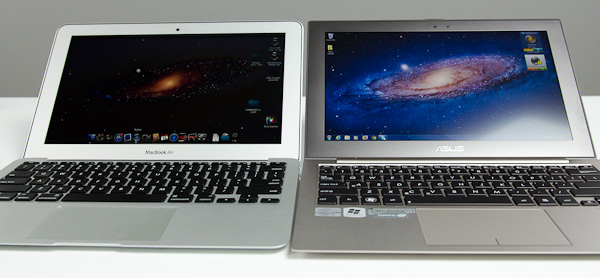
2012 MacBook Air (left) vs. 2012 ASUS Zenbook Prime (right)
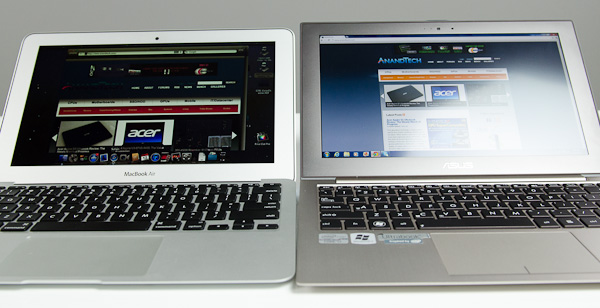
2012 MacBook Air (left) vs. 2012 ASUS Zenbook Prime (right)
ASUS also enjoys a resolution advantage, but it's not really high enough to make good use of integer DPI scaling (at 2x you get a UI sized for a 960 x 540 display). You get sharpness, and additional desktop area, but not the total package you get with the rMBP. There's no denying that what ASUS has done is better, it's just not perfect. And as Apple has shown us in the past, it's not fond of stopgap solutions.
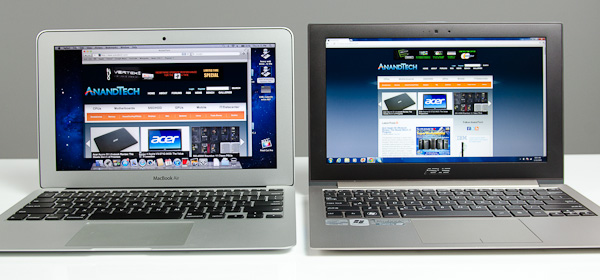
2012 MacBook Air (left) vs. 2012 ASUS Zenbook Prime (right)
Brightness, black levels, contrast, color accuracy and gamut haven't changed over the past year. The MacBook Air's panel remains one of the best non-IPS solutions on the market. The problem is that consumer insistence higher quality displays has pushed Apple's competitors to finally deliver more than TN at MacBook Air price points. Sooner rather than later, Apple will have to respond.
The Panel Lottery
Unlike in previous years, there appears to be three manufacturers supplying panels for the 2012 MacBook Air. LG Philips and Samsung return from before, but AUO now joins the fray. It's quite possible that Apple's volumes have grown large enough to justify adding a third supplier - a trend we may see increase in the future, and across more component categories.
As always, you can try to find out what panel is used in your MacBook Air by executing the following command in an OS X Terminal window:
ioreg -lw0 | grep IODisplayEDID | sed "/[^<]*</s///" | xxd -p -r | strings -6
The output will look something like this:

As long as Apple hasn't masked the data, the first line should be the part number of your display panel. The first one or two characters will tell you the manufacturer: LP for LG Philips, LT for Samsung and B for AUO. Anecdotally, LG and Samsung seem to be the most prevalent. In my personal experience with six 13-inch 2012 MacBook Airs and three 11-inch MacBook Airs, the breakdown was as follows:
13-inch $1499 - Samsung
13-inch $1499 - Samsung
13-inch $1499 - Samsung
13-inch $1499 - Samsung
13-inch $1499 - Samsung
13-inch $2199 - LG
11-inch $1099 - AUO
11-inch $1099 - AUO
11-inch $999 - Samsung
A thread over on Macrumors places the Samsung/LG split much closer to 50/50, however it's not clear if there's a higher incidence of LG panels in BTO or non-default configurations. We'd need many more samples to really get an idea for how all of this shapes up, so don't put too much faith in the results from my experience.
Apple does its best to ensure that all three panels deliver comparable performance, however there are differences. Let's first start with the numbers:
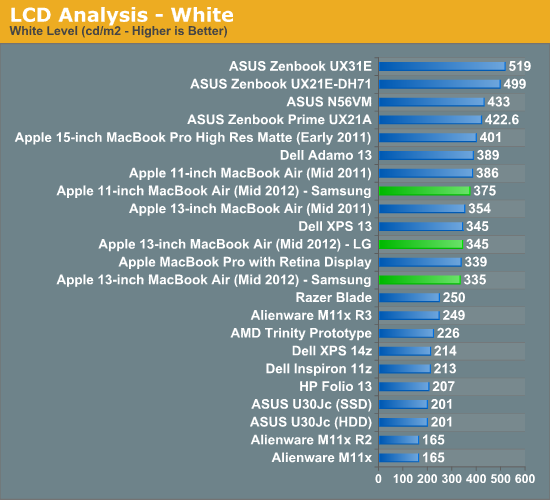
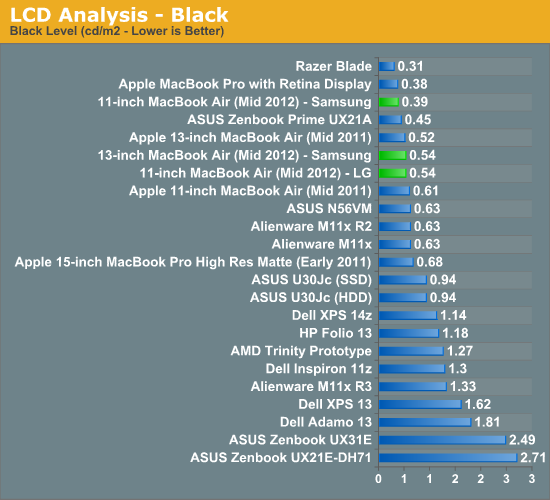
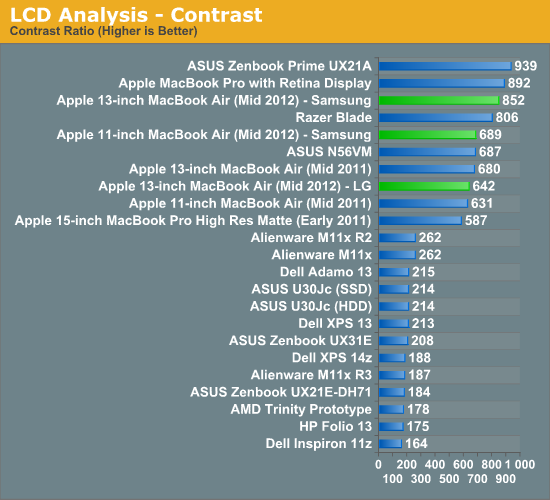
The 13-inch LG panel delivers tangibly worse black levels than the Samsung alternative. There's even a pretty dramatic difference in black levels between even the 11 and 13-inch Samsung panels. It's also possible that there's panel to panel variation at play here that would result in this sort of a difference.
The LG panel is a bit brighter, which helps it reach a decent contrast ratio but the 13-inch Samsung panel's low black levels give it an advantage. Interestingly enough, the 13-inch LG sample performed very similarly to the 11-inch Samsung. I really do wonder how much of this difference is just normal variance between panels.
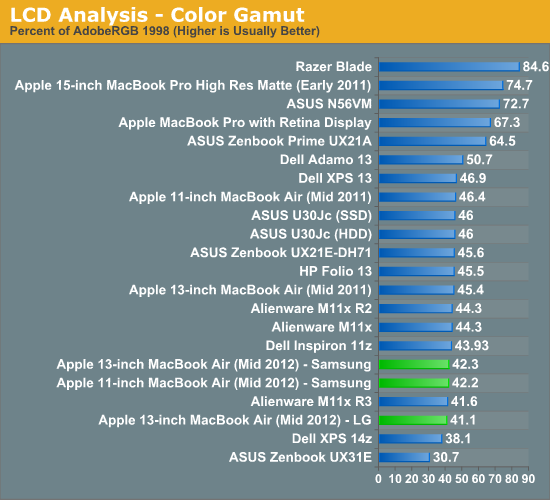
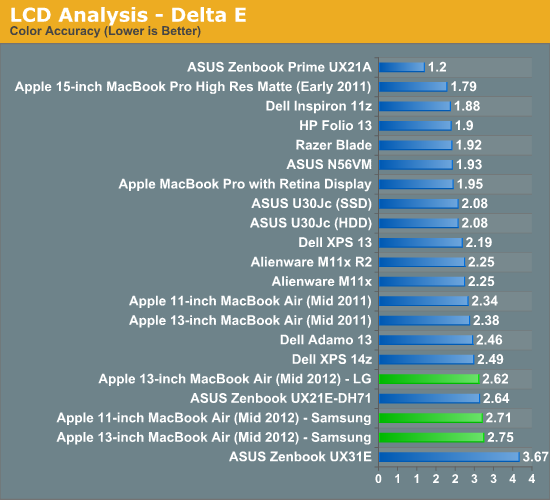
Color accuracy is slightly better on the LG panel, although it's not beyond the noticeable threshold. Color gamut is comparable between the displays.
Independently, neither the Samsung or LG panels is particularly bad to look at. These are still TN panels so you get poor vertical viewing angles, but the quality is still better than the cheaper TNs we often see used in less expensive notebooks. It's when you compare the two or you're used to one that you can really tell a difference: the Samsung panel, particularly when displaying black text on a white background, looks better than the LG.
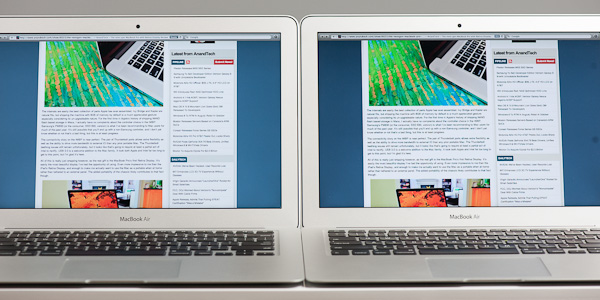
13-inch LG LP133WP1-TJA3 panel (left) vs. Samsung LTH133BT01A03 panel (right)
I had some friends over and tossed them a pair of 13-inch MBAs. One had the LG panel and one had the Samsung panel. They used the MBAs and swapped after a short while. Almost instantaneously they could tell the difference between the panels. Everyone significantly favored the Samsung.
I was actually a bit surprised how quickly they noticed the difference. With these type of things I always assume I'm just more sensitive than most, but in this case the difference was noticeable enough to pick out. Everyone added (and I agreed) that the difference was most pronounced because they were able to switch between two. In a vacuum each one seemed fine.
I tried my best to capture the difference between the two panels on camera. The easiest way to describe the difference is text on the Samsung panel just looks darker (mouse over the panel name in the table below):
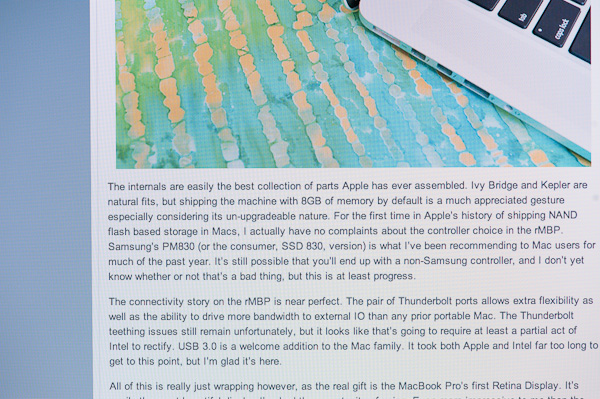
| LG LP133WP1-TJA3 | Samsung LTH133BT01A03 |
| original | original |
Just like last time, I believe the two panels behave differently in how they react to off-center viewing angles but I couldn't really capture the slight differences on camera. Although I didn't have an AUO equipped MBA on hand, the one I saw in an Apple store looked closer to the LG than the Samsung.
The good news is after a calibration pass using Color Eyes Display Pro, the difference between the two is significantly reduced - to the point where I can no longer tell the two apart:
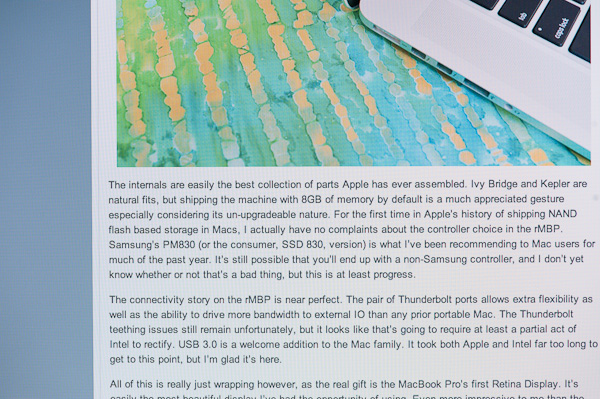
| LG LP133WP1-TJA3 | Samsung LTH133BT01A03 |
| original | original |
The obvious problem with this solution is you need access to a decent colorimeter or spectrophotometer and calibration software. There are some color profiles floating around the web that may help (I've uploaded mine for the LG here, Samsung here) but every panel is going to be at least somewhat different so this is still not perfect.
Subjectively, I'm fine with the LG panel, although I do like the look of the Samsung better. Both are a bit of a disappointment compared to what you get from the Retina Display in the MacBook Pro however. It's just presently what you give up for portability and cost.
To Make a Retina
The thing about the MacBook Air is that it's already quite minimized on the inside. The vast majority of the chassis is occupied by a battery, and there's no traditional HDD or optical drive to remove for additional space. Apple can't simply toss a much higher resolution panel on the system and call it a day, at least not without a tangible reduction in battery life.
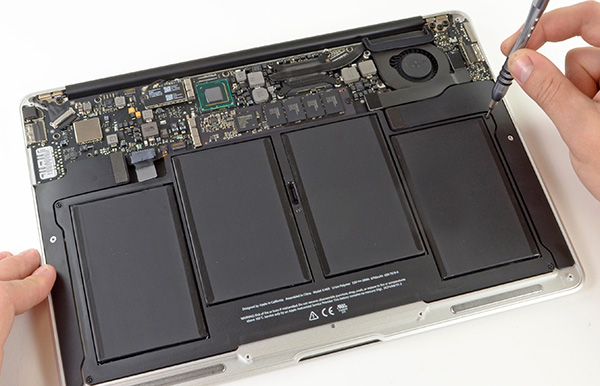
13-inch MacBook Air (Mid 2012) - iFixit
Apple had to give the MacBook Pro with Retina Display a 95Wh battery (up from 77.5Wh) just to deliver similar battery life to the regular MacBook Pro. The higher resolution display requires a brighter backlight to push light through the panel and maintain comparable brightness levels.
The motherboard itself can stand to lose a single chip (the PCH) with the transition to Haswell, but that's not going to give us a ton of space either.
In the short term Apple could opt for a slightly thicker chassis (similar to what happened in the 3rd gen iPad) to accommodate a larger battery. Eventually the hope is that panel efficiency will increase to the point where we won't need significantly brighter backlights.


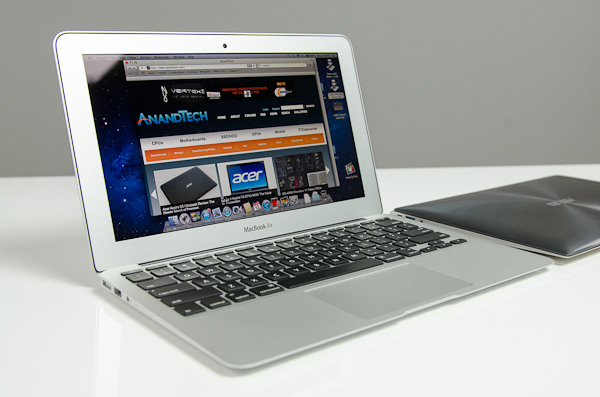








190 Comments
View All Comments
KPOM - Tuesday, July 17, 2012 - link
If you want to tinker with the system, get to know Terminal. It's a fully functional, full-blown Unix command line. Lots of Mac "tricks" involve using Terminal.There is a lot of eye candy in OS X, and unlike Windows, the standard utilities don't include lots of customizations, as that's a deliberate design decision. However, the functionality is there. OS X provides X Window support as well.
Apple isn't a Windows OEM. They aren't obligated to optimize their PCs to run Windows. They make it available as a backstop. It isn't a matter of "forcing" people to us OS X. No one is "forced" to use OS X or buy a Mac. Boot Camp makes it less "risky" for someone with a lot of legacy software to make the switch since it provides a way for it to work. It doesn't promise and Apple doesn't advertise a system optimized to run Windows.
Karltheghost - Wednesday, July 18, 2012 - link
I think you're still getting me wrong. . .I live in Europe and here apple isn't as strong as in the USA for example. 90% are using Windows here. However, there are many people who would like to buy a macbook to run another OS on it, because they like the hardware. And actually it is officialy sold to possibly be used with Windows (If you go into a store, ask the guy at the counter if you can use windows the answer is yes) . But that's only possible with huge restrictions. They would sell a ton more machines if they would give full support for other OS.
And the other matter according OSX that you've overlooked is their privacy policy and license agreement. Data privacy is quite a big deal to many persons here and to me it's one, if not the main reason not to use OSX
pmhparis - Wednesday, July 18, 2012 - link
You vastly overstate the problems with using Windows on Apple Hardware to the point that I see sour grapes in your comments.I'm coming from a background of years of Windows PCs. For the last few years I was a regular user of VMWare to get access to the different OS environments I need.
I bought a rMBP to replace a Dell e6500 that was coming to the end of it's rope and my collegues are all drooling over how relatively Parralels makes using Windows VMs in OSX. The fact that it just works largely overcomes the minor problem of any performance hit. Besides, the rMBP is brand new and thus faster than all the other PCs so the Windows VMs are still faster than their PCs.
I very rarely see the need to actually boot to windows using bootcamp as the windows bootcamp partition is shared with a VM instance btw so it's the same "machine" whether in a VM or in parallels, When using bootcamp the battery drains faster but even so the rMBP has a longer battery life.
As someone actually using windows on a a rMBP the only reasons I can see for your comments are all irrational
Karltheghost - Wednesday, July 18, 2012 - link
"Besides, the rMBP is brand new and thus faster than all the other PCs so the Windows VMs are still faster than their PCs."But what you don't mention is, that it is still slower than it would be with decent drivers . . . or still slower than a PC Laptop with similar hardware.
I don't want to run Windows in a VM, i want Windows (or Linux) ONLY, no OSX at all.
"When using bootcamp the battery drains faster "
This sounds like a restriction to me. I don't know about the new rMBP but with the 2011er MBP it was like 30 or 40% battery capacity just vanished.
Don't get me wrong, if i would get the same battery life and computing power running Windows (or Linux) on the MBA, i would buy it. But as it seems to me i may be overstating a bit but you are trying to sweep this (nevertheless existing) problem under the carpet
KPOM - Friday, July 20, 2012 - link
But again, you don't seem to "get" that Apple doesn't want to sell you a Mac so that you can run Windows on it. They try to sell an integrated experience.Would the iPhone sell more if they let you run Android on it? Do you think Apple would ever do that? Would you expect them to?
phillyry - Tuesday, March 26, 2013 - link
Battery life doesn't magically disappear. It's just not as good under Window 7 as it is under OS X.phillyry - Tuesday, March 26, 2013 - link
But the point was that some people just want the hardware.The point was also made that the sales reps at the Apple Stores say that if runs Windows.
Hopefully we all know to take the words of sales reps with a grain of salt.
Win7 runs alright and they did improve the battery life with the last update but the trackpad lacking all the OS X gestures is a real nag.
phillyry - Tuesday, March 26, 2013 - link
"a friend of mine payed 170€ just for a new iphone battery". Seriously?Where I live you can walk in to any Apple store with any iOS device and, if they can't fix it on the spot (okay, appointment required), then they'll offer you a replacement of the device for $100.
KoolAidMan1 - Wednesday, July 18, 2012 - link
Not at all, its just that the hater posts are irrational as usual.As for being disposable as you said in a post below, nonsense. Macs hold their resale value VERY well, I wish that my PC parts could be sold for as much after 2-3 years. The longest I've ever held any of my machines were my Macs (6 years for one of my production desktops).
The rest of your post is based around anecdotal evidence. I don't know a single person who returned their Macs after only a few weeks based around "flaws" that you don't go into. Again, quite the opposite, longevity and high resale value are two huge things you're getting with one.
Karltheghost - Wednesday, July 18, 2012 - link
Fanboys are irrational as well ;)Actually there are PC parts which can be resold for a good price, look at the Thinkpads or Toughbooks.
Of course it's anecdotal evidence, like i said so in my posts . . . but actually you'll find some manufactor whose "official" reputation is a lot better than personal experience in every market. Usually where you've got so aggressive Marketing, that objectivity is lost. For example there is FOX for mountainbike suspension or beats in the audio sector. And it seems to me it is apple in the computer sector . . .
The flaws are mainly compatibility issues, if you have expensive software that is supposed to run on mac and if you install it, it is heavily crippled you sure are not very enthusiastic